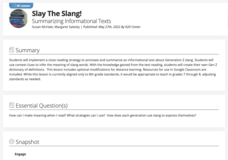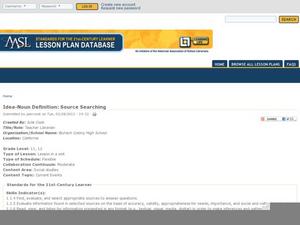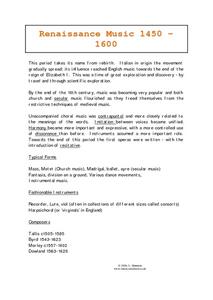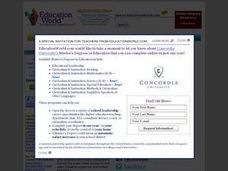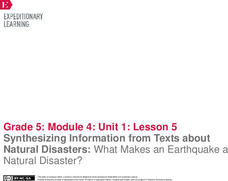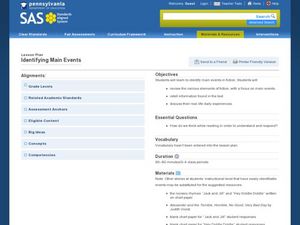Curated OER
Dig In
Students identify where vegetables originate from. In this agriculture lesson, students use a search engine to find out where certain vegetables originate from. Students plot the information onto a world map.
EngageNY
Mid-Unit Assessment: On-Demand Note-taking and Text-Dependent Questions
Flex those brain muscles! Scholars take a mid-unit assessment, conducting research to take notes about how a particular invention helped meet society's needs. To complete the test, they work on draft sketches for their graphic novelettes.
EngageNY
Conducting Research: Analyzing Text from the Qikiqtani Inuit Association (QIA)
Scholars read excerpts from the Qikiqtani Inuit Association website as they begin researching their case studies on the Mary River Project. They read an article to build background knowledge and analyze key vocabulary words using the...
EngageNY
Comparing Meaning and Tone: The Fall of Saigon in Fiction and Informational Text
Who's that talking to? Readers listen to a reading of the "Forgotten Ship" transcript and answer questions focusing on word meaning and choice. They complete a chart to track the multiple narrators in the script. For homework, readers...
K20 LEARN
Slay the Slang! Summarizing Informational Texts
Middle schoolers get hip to the jive with a lesson about slang. They closely examine examples of slang and use context clues to infer the meaning of the terms. Groups read and summarize an article about a teacher who created a Gen Z...
Curated OER
Research Skills: Evaluating Information and Sources
While this focuses on Ancient Rome, the objectives are improved research and information evaluation skills. In one class period, class members narrow their topic, research it, select the best information, log useful sources, and discuss...
Curated OER
Idea-Noun Definition: Source Searching
A great idea for showing language arts pupils the universality of themes, even in the real world! Have class members choose an idea-noun (peace, justice, war, love, etc.) at the beginning of the year or semester. They complete weekly...
Curated OER
Renaissance Music 1450 -1600
Hand it out and let them read all about the music of the Renaissance. The class will discscover basic terminology that developed during the time period, musical style, and how music was linked to the church and everyday life.
Curated OER
Working on the Slant
Compare and contrast a major news story from various newspapers. How does the perspective change? Are certain things included in some of the stories and left out of others? Have pupils complete a graphic organizer to compare how...
Curated OER
Caves
Explore caves with your class! Your scholars will participate in scientific observation, research, inference and deduction, reading, vocabulary, and writing activities about caves with this lesson plan. This resource contains five...
Core Knowledge Foundation
Taking Care of the Earth Tell It Again!™ Read-Aloud Anthology
A read-aloud anthology closely examines human impact on the Earth while boosting reading comprehension skills. Through stories, scholars examine the concepts of natural resources, pollution, garbage, and recycling and brainstorm ways to...
Scholastic
Making Judgments Practice
Encourage young learners to identify persuasive writing techniques in a text with this resource, which includes two multiple-choice worksheets with advertisements for students to analyze.
Curated OER
Red Dirt Groundbreakers
Discover Oklahoma's first farmers. Read about 14 different agriculture workers and their contribution to Oklahoma's farming. After reading, have your class complete several activities such as researching an agriculturist, writing a...
Curated OER
Ben Franklin Timeline
Celebrate inventions such as lightning rods, bifocals, and stoves with a Ben Franklin Day. Young historians conduct research and write a paragraph about an accomplishment of Benjamin Franklin including an illustration or collage that...
EngageNY
Grade 9 ELA Module 2, Unit 3, Lesson 5
After rereading the full text of Walter Mosley's essay "True Crime," groups complete an evidence collection tool worksheet, and then class members independently draft a multi-paragraph, evidence-based response that identifies how Mosley...
Core Knowledge Foundation
Early World Civilizations Tell It Again!™ Read-Aloud Anthology
Ancient world civilizations are the focus of a read-aloud anthology. First graders explore the early world of Mesopotamia, Babylon, the sphinx, and pyramids, get to know people of the Nile, Hatshepsut, and Tutankhamun, and examine world...
Core Knowledge Foundation
Animals and Habitats Tell It Again!™ Read-Aloud Anthology
A read-aloud anthology explores various habitats and the animals that inhabit them, from the Artic to the desert, the forest, and bodies of water. First graders listen to and discuss texts and complete word work. Each lesson offers...
Core Knowledge Foundation
Frontier Explorers Tell It Again!™ Read-Aloud Anthology
The last read-aloud anthology in the series showcases frontier explorers. First graders listen to texts about Daniel Boone, crossing the Appalacian Mountains, Lewis and Clark, dangers on the prairie, and more. After reading, pupils...
Core Knowledge Foundation
The War of 1812 Tell It Again!™ Read-Aloud Anthology
A read-aloud anthology consists of eight lessons about the War of 1812. Over 12 days, pupils listen to and discuss readings, practice word work, then complete extension opportunities designed for the class and home. Assessments gauge...
Core Knowledge Foundation
The Human Body—Building Blocks and Nutrition Tell It Again!™ Read-Aloud Anthology
A read-aloud anthology explores the human body. Over three weeks, second graders listen to and discuss texts related to the cells, tissue, organs, digestive system, excretory system, nutrients, and a balanced diet. Learners practice word...
Core Knowledge Foundation
Light and Sound Tell It Again!™ Read-Aloud Anthology
Light and sound are the running themes of a read-aloud anthology. Over three weeks, third graders listen to discuss readings in preparation for completing extension activities. Pupils work through the writing process to compose an...
EngageNY
Synthesizing Information from Texts about Natural Disasters: What Makes an Earthquake a Natural Disaster?
Are all disasters natural? Scholars reread Earthquakes! to determine what classifies these events as a natural disaster. They label earthquake facts as N for natural or D disaster to support their ideas. They then discuss academic...
EngageNY
Researching about the Red Cross, Continued: Who Is the Red Cross and What Does This Multinational Organization Do?
Code red! Learners read an informational article about the Red Cross, discussing the gist of the text in small groups. On a three-column note catcher, pupils take notes to show how the Red Cross functions as a multinational aid...
Curated OER
Identifying Main Events
Help kindergartners learn to identify the main events in fiction. They will review elements of fiction, retell information found in the text, and discuss their real-life daily experiences. All the while, they will be asking themselves...
Other popular searches
- Informational Text Features
- Informational Text Passages
- Teaching Informational Text
- Informational Text Structure
- Writing Informational Text
- Informational Texts Unit
- Informational Text Lesson
- Comprehend Informational Text
- Summarizing Informational Text
- Using Informational Texts
- Analyzing Informational Text
- Informational Text8rating=3






